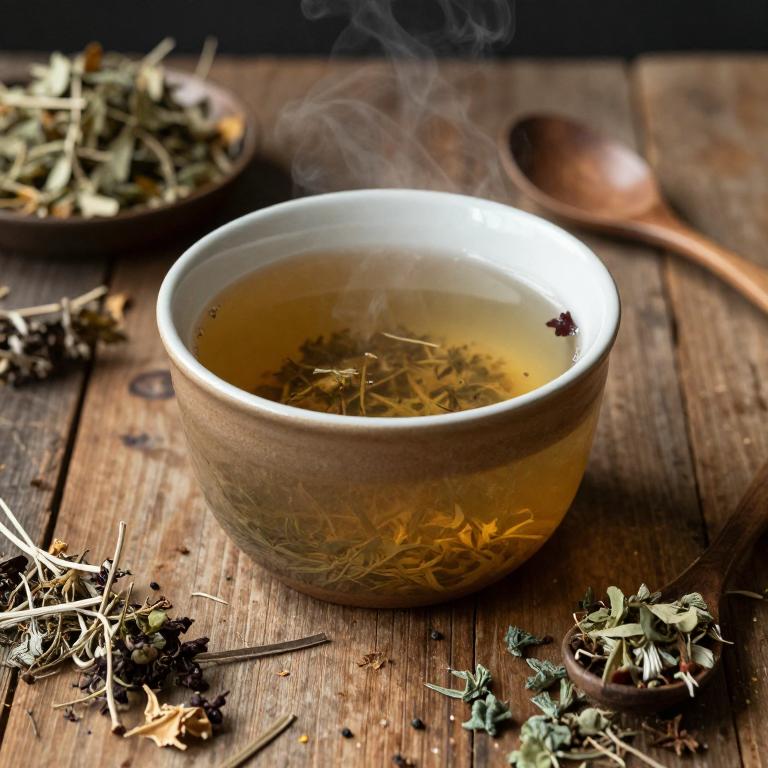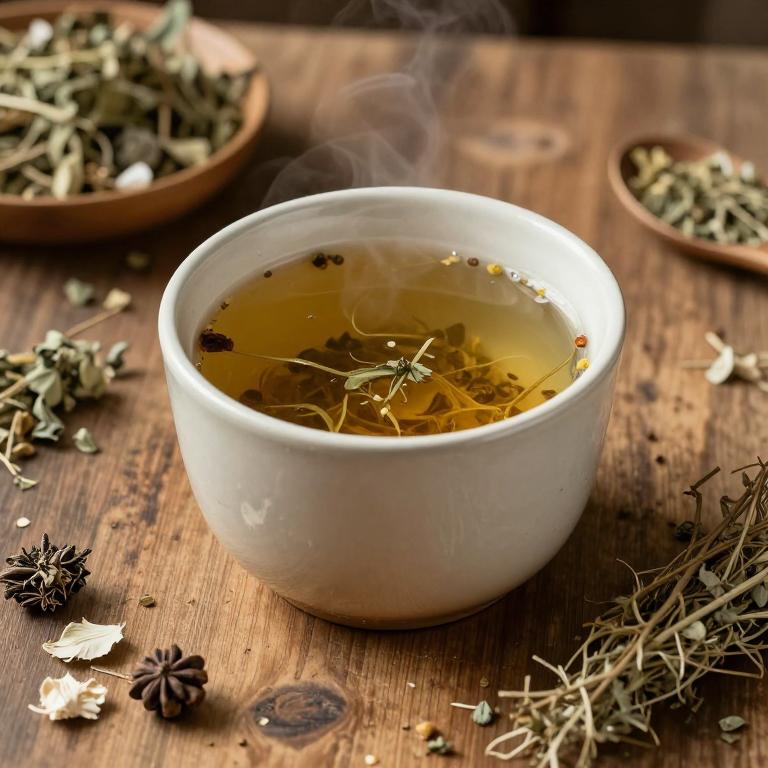10 Best Herbal Decoctions For Phlegm

Herbal decoctions for phlegm are traditional remedies that use a combination of plant-based ingredients to help reduce mucus production and ease respiratory congestion.
Common herbs used in these decoctions include eucalyptus, ginger, licorice root, and thyme, each known for their anti-inflammatory and expectorant properties. To prepare a decoction, the herbs are typically boiled in water for an extended period to extract their active compounds, then strained and consumed as a tea. These natural remedies are often preferred for their gentle effects and potential to support overall respiratory health without harsh side effects.
However, it is advisable to consult a healthcare professional before using herbal decoctions, especially for individuals with chronic respiratory conditions or those taking other medications.
Table of Contents
- 1. Eucalyptus (Eucalyptus globulus)
- 2. Thyme (Thymus vulgaris)
- 3. Ginger (Zingiber officinale)
- 4. Fennel (Foeniculum vulgare)
- 5. Peppermint (Mentha piperita)
- 6. Licorice (Glycyrrhiza glabra)
- 7. Scots pine (Pinus sylvestris)
- 8. Salvia (Salvia officinalis)
- 9. Rosemary (Rosmarinus officinalis)
- 10. Black pepper (Piper nigrum)
1. Eucalyptus (Eucalyptus globulus)

Eucalyptus globulus, commonly known as eucalyptus or gum tree, is widely used in herbal medicine for its expectorant and anti-inflammatory properties.
Herbal decoctions made from the leaves of Eucalyptus globulus are traditionally employed to help relieve symptoms associated with respiratory conditions such as coughs and excess phlegm. The active compounds, including cineole and other terpenoids, contribute to its ability to loosen mucus and improve airway clearance. These decoctions are often prepared by simmering the leaves in water for several minutes to extract the beneficial oils and compounds.
While generally considered safe, it is advisable to consult a healthcare professional before using eucalyptus globulus, especially for prolonged periods or in combination with other medications.
2. Thyme (Thymus vulgaris)

Thymus vulgaris, commonly known as thyme, has been traditionally used in herbal medicine for its expectorant properties, particularly in the treatment of respiratory conditions involving excess phlegm.
The essential oils found in thyme, such as thymol and carvacrol, are believed to help loosen mucus and promote its expulsion from the respiratory tract. When prepared as a herbal decoction, thyme can be consumed as a tea or added to steam inhalations to aid in clearing congestion. This traditional remedy is often combined with other herbs like eucalyptus or ginger to enhance its effectiveness.
However, it is important to consult a healthcare professional before using thyme decoctions, especially for individuals with known allergies or those taking medications.
3. Ginger (Zingiber officinale)

Zingiber officinale, commonly known as ginger, has been traditionally used in herbal medicine for its expectorant properties, which can aid in the removal of phlegm from the respiratory tract.
When prepared as a decoction, ginger is typically boiled with water to extract its active compounds, such as gingerol and shogaol, which possess anti-inflammatory and mucolytic effects. This herbal remedy is often recommended for individuals experiencing chest congestion or excessive mucus production due to colds, bronchitis, or other respiratory conditions. The warming and stimulating properties of ginger decoctions can help soothe the throat and promote easier breathing.
However, it is advisable to consult a healthcare professional before using ginger for persistent or chronic phlegm-related issues.
4. Fennel (Foeniculum vulgare)

Foeniculum vulgare, commonly known as fennel, has been traditionally used in herbal medicine to help alleviate symptoms associated with phlegm.
Its essential oil and dried seeds are often prepared into decoctions by simmering the plant material in water, allowing the active compounds such as anethole and fenchone to be extracted. These compounds are believed to have expectorant properties that can help loosen and expel mucus from the respiratory tract. Herbal decoctions made from fennel are typically consumed as teas or warm infusions to support respiratory health.
While generally considered safe, it is advisable to consult a healthcare professional before using fennel decoctions, especially for individuals with allergies or those taking medications.
5. Peppermint (Mentha piperita)

Mentha piperita, commonly known as peppermint, has been traditionally used in herbal medicine for its expectorant properties, making it a valuable component in herbal decoctions aimed at relieving symptoms associated with phlegm.
When prepared as a decoction, peppermint leaves are boiled to extract their essential oils and active compounds, such as menthol and menthone, which can help loosen mucus in the respiratory tract. This herbal remedy is often combined with other expectorant herbs like thyme or eucalyptus to enhance its effectiveness in clearing phlegm and reducing congestion. The cooling effect of peppermint can also soothe irritated airways and provide relief from coughing.
However, it is important to use peppermint decoctions in moderation, as excessive use may cause gastrointestinal discomfort or interact with certain medications.
6. Licorice (Glycyrrhiza glabra)

Glycyrrhiza glabra, commonly known as licorice root, has been traditionally used in herbal medicine for its expectorant properties, making it a popular ingredient in herbal decoctions for the treatment of phlegm.
The active compounds in licorice root, such as glycyrrhizin and flavonoids, help to loosen and expel mucus from the respiratory tract, thereby alleviating congestion and improving breathing. When prepared as a decoction, licorice root is often combined with other herbs like eucalyptus or thyme to enhance its expectorant effects. However, long-term use of licorice root decoctions may lead to side effects such as hypertension and fluid retention due to its impact on the adrenal glands.
Despite these potential risks, licorice root remains a valued component in many traditional herbal formulations for respiratory conditions involving phlegm.
7. Scots pine (Pinus sylvestris)

Pinus sylvestris, commonly known as Scots pine, has been traditionally used in herbal medicine for its potential respiratory benefits, including the treatment of phlegm-related conditions.
The resin and needles of the pine tree are often harvested and prepared into decoctions to harness their expectorant properties. These herbal decoctions are believed to help loosen and expel mucus from the respiratory tract, making them useful for individuals suffering from bronchitis or persistent coughs. The active compounds in Scots pine, such as terpenes and flavonoids, may contribute to its anti-inflammatory and mucolytic effects.
However, it is important to consult a healthcare professional before using pine-based remedies, as they may interact with other medications or cause allergic reactions in some individuals.
8. Salvia (Salvia officinalis)

Salvia officinalis, commonly known as sage, has been traditionally used in herbal medicine for its potential respiratory benefits, including the treatment of phlegm.
Herbal decoctions made from sage leaves are believed to help reduce mucus production and soothe irritated airways, making them useful for individuals suffering from excess phlegm or cough-related symptoms. The plant contains compounds such as thujone and flavonoids, which may contribute to its expectorant and anti-inflammatory properties. When prepared as a decoction, sage can be consumed as a tea or used in steam inhalations to enhance its therapeutic effects.
However, it is important to consult with a healthcare provider before using sage for medicinal purposes, as it may interact with certain medications or have side effects in some individuals.
9. Rosemary (Rosmarinus officinalis)

Rosmarinus officinalis, commonly known as rosemary, has been traditionally used in herbal medicine for its various therapeutic properties, including its potential role in addressing respiratory conditions.
Rosemary herbal decoctions are prepared by simmering the dried leaves in water, allowing the active compounds such as rosmarinic acid and flavonoids to be extracted. These compounds are believed to possess anti-inflammatory and antimicrobial effects, which may help reduce mucus production and alleviate symptoms associated with phlegm. Some studies suggest that rosemary may support respiratory health by promoting circulation and clearing congestion, though more research is needed to confirm its efficacy for specific respiratory ailments.
As a complementary therapy, rosemary decoctions are often used in combination with other herbs to enhance their effects on respiratory wellness.
10. Black pepper (Piper nigrum)

Piper nigrum, commonly known as black pepper, has been traditionally used in herbal medicine for its potential respiratory benefits.
When prepared as a decoction, black pepper may help to loosen and expel phlegm due to its pungent and warming properties. The active compounds, such as piperine, are believed to stimulate mucus production and improve bronchial secretions, aiding in the clearance of respiratory congestion. However, it is important to note that while some anecdotal evidence supports its use, scientific research on its efficacy for phlegm is limited.
As with any herbal remedy, it should be used with caution and under the guidance of a healthcare professional, especially for individuals with existing respiratory conditions or those taking other medications.